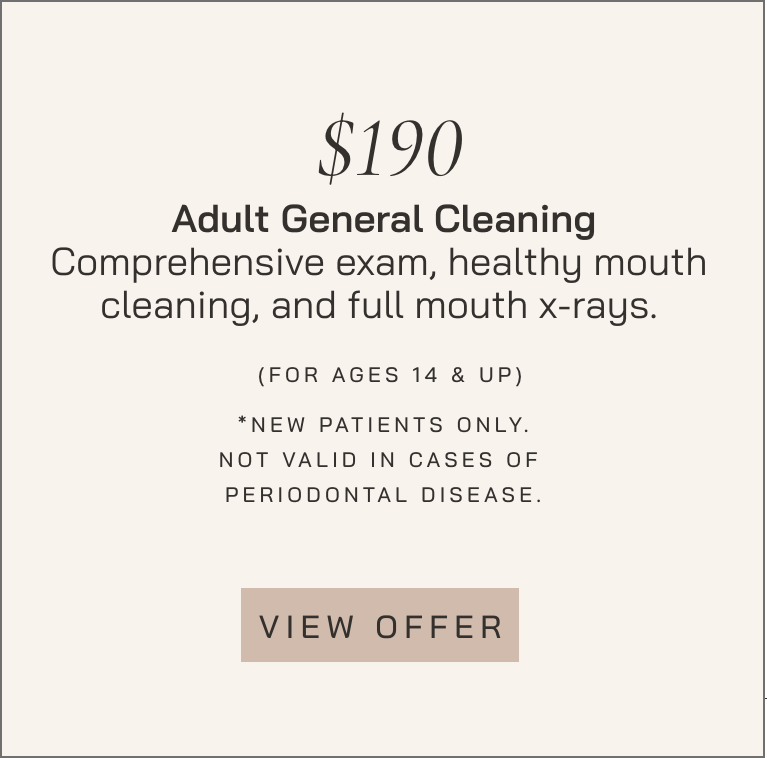Not Valid in cases of periodontal disease.
Dentures – Cocoa Beach, FL
An Elegant Solution to Tooth Loss
Full Dentures If you are missing multiple teeth, you are well-familiar with the inconvenience and embarrassment of an incomplete smile. Thankfully, modern dentistry offers a number of ways to fill in those gaps and give you back a confident, healthy grin. Dentures in Cocoa Beach, FL may be the ideal treatment for you.
Why Choose Nawrocki Dental of Cocoa Beach for Dentures?
- In-House Dental Implant Placement
- State of the Art Dental Technology
- Long-Lasting, Natural-Looking Prosthetics
Who’s a Good Candidate for Dentures?

No matter how many teeth you are missing, dentures can be a reliable option for tooth replacement. Before receiving these prosthetics, though, you must schedule a consultation with Dr. Nawrocki. This visit will allow him to determine if you are a good candidate for treatment. Although some individuals do not require additional services, your dentist may recommend that you receive gum disease treatment, tooth extraction, or bone grafting should the health of your teeth, gums, or jawbone need to be restored.
Effects of Missing Teeth

Some of the most common reasons for tooth include:
- Poor oral hygiene
- Advanced gum disease (periodontitis) that leads to bone and tooth loss
- Facial trauma (i.e., knocked-out tooth)
- Smoking or using tobacco products
The American Academy of Periodontology reports that the effects of missing teeth can include facial collapse or sagging, difficulty eating and speaking, and a lack of self-esteem. When these problems arise, it is not just the physical components of tooth loss that can take a toll. It is also the mental and emotional decline a person can experience over time.
What Qualifies You for Dentures?

Dr. Nawrocki’s dedication to helping patients enjoy life with full, functional, and healthy smiles is why he meets with each individual to discuss the benefits, processes, and results associated with customized dentures. Patients must be committed to taking care of their new teeth if they want to ensure they last as long as possible. Doing so will help improve their facial appearance as well as their ability to comfortably eat and speak once again.
When examining a patient’s smile, Dr. Nawrocki will determine how many teeth are missing before recommending a full, partial, or implant denture. Depending on the individual’s preference, budget, and oral health, one solution may be better than another.
Alternative Tooth Replacement Options
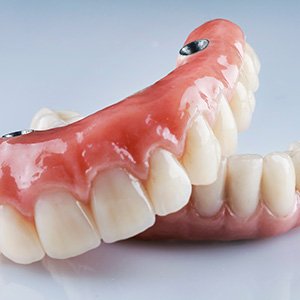
Patients who are not considered good candidates for dentures, though, can still receive help by pursuing one of our alternative tooth replacement options. These include:
- Dental Bridges – These prosthetics are great for patients who have multiple missing teeth along an arch and are side by side. When considering this option, Dr. Nawrocki will need to check the health of the abutment teeth on either side of the gap to ensure they are in good shape to support the custom bridge.
- Dental Implants – A healthy jawbone is necessary to receive dental implants, as the titanium posts that make up the “roots” of these prosthetics must fuse with the bone to create a strong foundation. Once in place, these new teeth can deliver exceptional stability and longevity, but they are costlier than traditional dentures.
Your Options for Dentures

There is not just one kind of denture available. Some are meant to replace an entire arch of teeth while others only fill in a few gaps. Some are permanently attached to dental implants while others are removable. The kind of personalized denture you get will reflect your unique needs.

Full Dentures
Full dentures replace an entire arch of teeth. They consist of a gum-colored base and artificial teeth that are made out of porcelain or acrylic. Natural suction or a denture adhesive helps them to stay in place throughout eating and speaking. When they fit well, full dentures can be quite comfortable and restore your ability to enjoy many of your favorite foods. You can expect your prosthesis to last for five to eight years before you need to replace it.
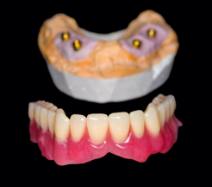
Dental Implant-Retained Dentures
Rather than using natural suction or an adhesive to stay in the mouth, implant-retained dentures are anchored in place via small titanium cylinders that are surgically placed below the jaw line. This offers superior comfort and a bite force that is comparable with that of natural teeth. Implant-retained dentures may last for decades before they require replacement. Although they tend to cost more than other treatment options, many patients agree that they are well worth the price.
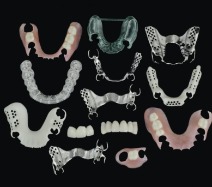
Partial Dentures
As their name implies, partial dentures do not replace an entire arch of teeth. Rather, they serve to replace multiple teeth at various places throughout an arch. You can think of a partial denture as a puzzle piece; it might have an odd shape, but it fits in exactly where it is needed. This type of prosthesis may need special clips or attachments to hold it in place.
The Benefits of Dentures

Now that you have a better understanding of who dentures can help, it’s natural to wonder how they might benefit you. Gaps in your grin can detract from your daily quality of life because tasks that once felt so simple, like speaking and eating, are suddenly much more challenging. Thankfully, these versatile prosthetics can simultaneously rebuild your smile’s functionality and appearance, whether you’ve lost some or all of your natural teeth.
Continue reading to learn more about your restoration's many advantages, and feel free to contact us with any additional questions.
Psychological Benefits

Many people struggle with the unexpected changes that come with tooth loss and start to feel self-conscious about the condition of their grins. The spaces left behind by missing teeth can affect your abilities and how you look, detracting from your confidence. You might remain tight-lipped or try to avoid spending time with others if you’re overly worried about being judged.
With artificial teeth in place, you can enjoy a more rewarding social life because you’ll look and feel like your best self.
Clearer Enunciation

You might notice a lisp or other changes in your speech patterns after losing some of your adult teeth. After all, they play an essential role in your ability to pronounce certain words because you must press your tongue against them to create a wide range of sounds.
It often takes about a month for your tongue and other supporting muscles in your mouth to adjust to wearing your dentures. Then, once they do, you’ll be able to speak as clearly as ever so you can be more easily understood.
Improves Nutrition

Unfortunately, many nutrient-rich foods that are important for your dental and overall well-being are hard to eat. For example, chewy meats and raw fruits and veggies have many essential vitamins and minerals but can be nearly impossible to consume without a complete set of teeth. You might stick to softer foods that aren’t as healthy and become malnourished or develop gastrointestinal issues from swallowing overly large pieces of food.
Once you’re fitted with dentures, you’ll enjoy a wider variety of ingredients to keep your teeth, gums, and body happy and healthy.
Preserves Oral Health

Although you might think of your teeth as immovable mounds in your mouth, the truth is that they’re connected by tissues, muscles, and ligaments with a natural capacity for movement. They’re prone to drifting out of their proper places to fill in the gaps left behind when teeth fall out. This can prematurely wear down your enamel, leading to tooth decay or other injuries.
Wearing dentures helps ensure that your teeth remain in their appropriate positions to safeguard your smile.
Expands Opportunities

Did you know that, according to a study done in 2019, the probability of being employed was negatively associated with poor dental health? One of the first things people notice about you is the condition of your grin, and if yours is full of holes, you might be remembered for the wrong reasons.
With dentures in place, you can act and feel confident during your upcoming job interview, date, or other momentous occasion to make a positive first impression.
Dentures Aftercare

When you first receive your dentures, you’ll likely experience plenty of new sensations. This can make it feel like you’re wading into uncharted territory. In situations like this, building familiar habits can be calming and grounding – and fortunately, the denture aftercare routine is easy and simple! We’ve put together some tips for maintaining your new prosthetic, but don’t hesitate to give our friendly team a call if you have any questions.
Remove After Eating
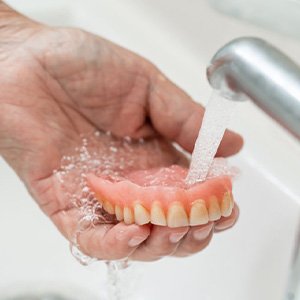
To keep your dentures looking pristine and protect yourself from harmful bacteria build up, you should remove and rinse them after every meal.
It’s important not to use hot water to clean them, though. High temperatures can warp the shape of your dentures, resulting in a poor fit that could cause discomfort.
Clean Your Restoration
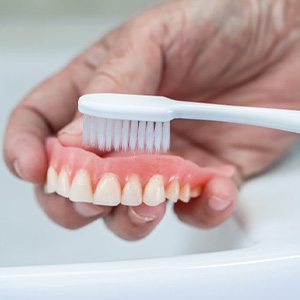
Post-meal rinsing goes a long way towards preventing bacteria build up, but your dentures will still need thorough cleaning at least once per day.
All you need is soft-bristled toothbrush and hand soap (stiff bristles and toothpaste are too abrasive for dentures and will cause premature wear). After removing your replacement teeth, brush them from top to bottom, making sure to get the underside. Then simply give them a good rinse, and you’re done!
Keep Your Dentures Safe

Your dentures will probably be in your mouth most of the time. However, leaving them out on a countertop or table exposes them to bacteria – and damaging accidents! When not in use, take care to secure them in a safe place.
Additionally, since dentures can be a bit slippery while you’re cleaning them, we recommend laying a soft towel out over your sink during brushing routines. That way, if they fall, they’ll be less likely to break.
Remove When You Sleep
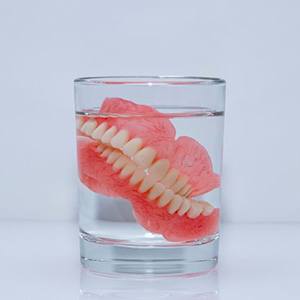
Not many people realize that the gums need circulation as much as the rest of the body. Dentures are designed to fit snugly to these pink supports, which restricts their blood flow.
That’s why even if you wanted to, wearing your dentures 24/7 isn’t a good idea. Removing them at night, before you go to bed, is a convenient way to give your gums a much-deserved break.
To be especially efficient with your denture care, you could soak them in a denture cleaning solution overnight. Just remember to rinse them off before putting them in your mouth the next morning!
Notice Changes

This could mean changes in your oral health or the way your dentures feel. Mouth sores, gum irritation, and denture slippage, shifting, or clicking could indicate it’s time for an adjustment. Schedule an appointment with Dr. Nawrocki, and he’ll make sure your dentures fit safely and comfortably again.
Understanding the Cost of Dentures

With so many variables involved with finances and dental care, it can be difficult to get the care you need without a little help. That’s why at Nawrocki Dental of Cocoa Beach, we strive to make it easy for you to make an informed decision about your care. If you’re curious about the factors that affect the cost of dentures, read more below. Then, schedule your consultation with us to learn more. Our team is dedicated to helping you find the best fit for your smile and your wallet!
Factors that Affect the Cost of Dentures

Dentures are never one-size-fits-all. They are individually tailored to meet the needs of each patient. Because of this, the price of your prosthetics may be vastly different from another patient's. Here are some of the ways the cost can fluctuate:
- Preparatory Treatments: If teeth need to be extracted or if there are other pre-treatment requirements, this can increase the overall cost.
- Denture Type: There are several types of dentures available from partials to full and even implant restorations. Each has a varying base cost.
- Material Quality: The type of acrylic used for the denture base and the quality of replacement teeth (acrylic or porcelain) have a big impact on the overall price.
- Customization: Fully customized dentures designed for a natural, comfortable fit need to be more precisely manufactured.
Looking at this list, it may seem tempting to choose all the cheaper options. However, investing in quality can make your experience much more comfortable and help your prosthetics last much longer!
Are Implant Dentures More Expensive?
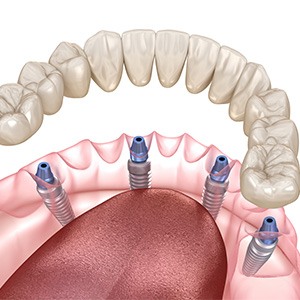
Implant dentures tend to come with a much higher up-front investment than other traditional types. But in the case of denture appliances, you really do get what you pay for! Implant dentures offer several advantages that truly go above and beyond.
These restorations are attached to dental implants—titanium fixtures surgically placed into your jawbone. Once the fixtures are healed, specialized prosthetics are placed over them and are anchored securely.
This provides a more stable and lifelike feel as well as jawbone stimulation that will keep your face looking youthful longer. Afterward, you’ll be able to eat all your favorite foods, smile with confidence, and feel better with your improved quality of life.
Does Dental Insurance Cover Dentures?
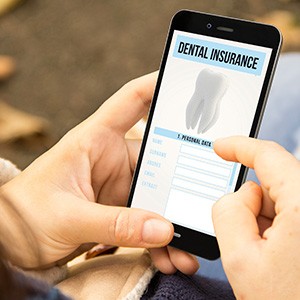
Dentures are generally considered a major procedure, meaning that dental insurance often covers a portion of the cost (typically around 50 percent.) However, coverage varies by plan and provider. If you’re unsure about your coverage, or just need help with the finer details, our team will be glad to help you maximize your benefits. We’ll guide you through the process and make sure you have a clear understanding of any out-of-pocket expenses and reductions before treatment begins.
Other Options for Making Dentures Affordable
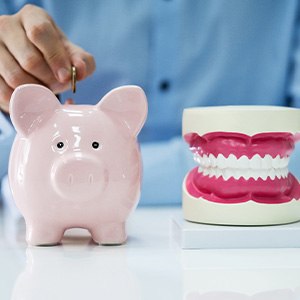
We know that not every patient has access to dental insurance, but our team is committed to making sure that you have access to care regardless. Here’s how:
- Nawrocki Loyalty Plan: Our in-house dental plan provides discounts on many treatments, including dentures. This option is perfect for patients without insurance, helping reduce the overall cost.
- CareCredit: We also accept CareCredit, a healthcare financing option that allows you to split the cost of your treatment into manageable monthly payments.
We want to help you find a solution that fits your schedule budget. So, contact us today to learn more about your options and how we can help you achieve a healthy smile without financial stress.
Denture Frequently Asked Questions

Are you looking forward to getting dentures in Cocoa Beach? If you ever have any concerns about the way that your restorations fit or work, don’t hesitate to contact our dental office. You can also read below to find some answers to the most common questions that we receive from our patients about their dentures.
How often should I replace my dentures?
Unfortunately, full and partial dentures can’t last forever. This is due to factors such as a changing jawbone and facial shape after sustaining tooth loss for long periods of time. On average, dentures should typically be replaced every five to eight years and regularly brought in to our dental office to be adjusted and examined. As your jaw begins to change in shape, you may notice that your dentures become loose or start to shift in your mouth and make it difficult to eat and speak. This is a tell-tale sign that they need to be examined and possibly replaced.
Can I sleep in my dentures?
It’s not recommended that you sleep in your dentures for several reasons. First, your gums need a rest after supporting your restorations all day, and the best way to do this is by taking them out at night. Secondly, your dentures need to be soaked overnight in a denture solution or room temperature water in order to preserve their shape. If they aren’t, they could dry out and become difficult to wear. And lastly, you should never go a full 24 hours without taking out your dentures to clean them and your mouth. This will help you avoid additional instances of tooth loss.
How can I tell if I need my dentures adjusted?
Bringing your dentures in for adjustments and repairs is completely normal. Accidents happen, and with a timely fix, you can preserve your oral health and continue using your restorations like normal. Here are some signs that could signal that you need to visit your dentist:
- Cracked dentures
- A persistent odor or stains
- Change in speech pattern
- Oral sores
- Gum irritation
- Changes in the fit of your dentures
- General oral discomfort
- Difficulty chewing
If you notice any of these, be sure to contact our dental office so we can schedule an appointment for you as soon as possible.
Do I still need to visit my dentist every six months if I have dentures?
Even though your restorations can’t develop oral health problems, it’s still important for you to visit your dentist every six months for checkups and cleanings. Without the proper dental care, you may face an increased risk of tooth loss or gum irritation, which could impact your ability to wear your restorations.

